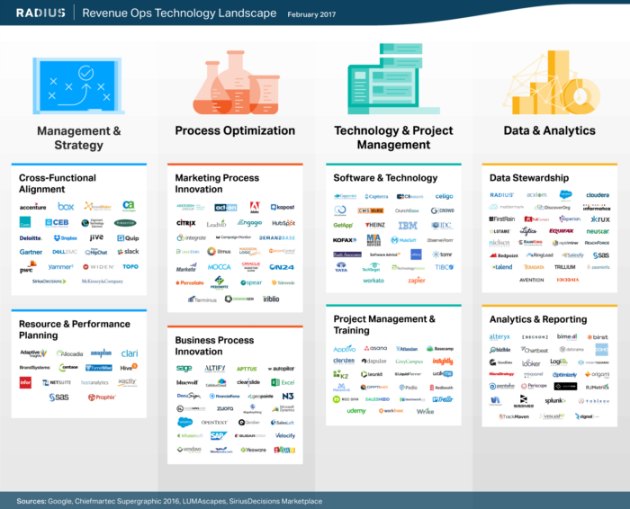Sign up to gain access to thousands of marketing resources! Don’t worry … It’s FREE!
Marketing isn’t all catchy taglines, Instagram Likes, and live video views. Marketing Operations can (and increasingly needs to) deliver real value directly to the bottom line.
Scott Brinker observed the shift in mindset occurring several years ago: “If there was a metaphorical basement in the House of Marketing, marketing operations was down there, shoveling data like coal. But then a funny thing happened. The world got wired…. Data and software were moving from the back office to the front office. And the center of gravity in marketing started to shift to those who could make that machinery work.”
Like Scott, B2B marketer Shari Johnston sees potential in this evolution. In her view, marketers today should be part of an entirely new type of organization—one that combines the best of marketing and sales operations with a focus on driving revenue.
And Shari knows just how much revenue marketing can contribute. As senior vice-president of marketing at B2B software company Radius, Shari oversees marketing strategy and execution across the company. Previously, she led demand generation for OpenDNS (acquired by Cisco), and prior to that played a key role in positioning Demandbase as the leader in account-based marketing technology.
I invited Shari to Marketing Smarts to discuss how marketing operations roles have evolved, creating a new paradigm in which marketing is a direct contributor to an organization’s revenue strategy. I also wanted to discuss her perspective on the increasing need for marketers who can manage the incredible amount of data and technology tools available in the B2B space.
Here are just a few highlights from our conversation:
The sudden focus on marketing revenue wasn’t really all that sudden (02:44): “Definitely, we’ve seen a pretty drastic evolution, especially with the introduction of marketing automation and the ability to really track Marketing’s influence on pipeline and the exact metrics associated with that. You see a pendulum shift of the creative marketer to a much more data-driven marketer over the last 15 or even 20 years. There’s been quite a bit of change throughout this time, really putting marketing at the forefront of revenue generating with their Sales counterparts.“
Building the right technology stack takes some research (but it’s worth it) (07:54): “Scott Brinker does a really comprehensive landscape of tools of different technologies and where they fit into the areas you’re trying to optimize for. We’ve also put out one recently with some partners that helps home in on just the revenue-ops piece of the puzzle and what technologies you might look at for that path to revenue operations.
“No two organizations are the same. Doing due diligence to understand what technology drives your go-to-market strategy the best can be really fruitful. For instance, if a lot of your revenue is primarily driven from customer upsell and cross-sell, you certainly would have a different technology stack and different needs than a company that was in a large-acquisition mode and has a lot of greenfield in terms of their addressable market.“
If you haven’t tried predictive analytics, now’s the time (11:40): “The first use case I had for predictive [analytics]…I was doing one of our first iterations of account based marketing internally at Demandbase and I was really struggling with going through thousands and thousands of rows of accounts to try to figure out what prospects look a lot like my current customers, modeling it on my own, acquiring different data sets from different organizations, manually scrubbing lists to try to make this target account list….
“I was introduced to predictive that could really help me apply data science to this process and streamline it from being a six-week data project for me and my team to being something that is a lot more scalable. Now I have a process in place to help make a clean go-to-market strategy with a new account list that helps evolve my addressable market as my business changes…. Certainly I saw incredible results in terms of helping reduce sales cycles. We saw an increase in our average deal size. We really saw conversion rates improve all the way through the funnel, as well.”
To learn more, visit Radius.com. You can also follow the company on Twitter @Radius, and follow Shari on Twitter @ShariAJohnston.
Shari and I talked about much more, so be sure to listen to the entire show, which you can do above, or download the mp3 and listen at your convenience. Of course, you can also subscribe to the Marketing Smarts podcast in iTunes or via RSS and never miss an episode!
This episode brought to you by FullContact:
FullContact is the most powerful fully connected-customer insights platform for companies that need to master their customer interactions. Great customer experiences depend on knowing your customers better than ever. FullContact enables this through world-class identity-resolution technology with a robust data asset, analytics, integration, and a service delivery model.
Music credit: Noam Weinstein.
This marketing podcast was created and published by MarketingProfs.

Kerry O’Shea Gorgone is director of product strategy, training, at MarketingProfs. She’s also a speaker, writer, attorney, and educator. She hosts and produces the weekly Marketing Smarts podcast. To contact Kerry about being a guest on Marketing Smarts, send her an email. You can also find her on Twitter (@KerryGorgone) and her personal blog.

